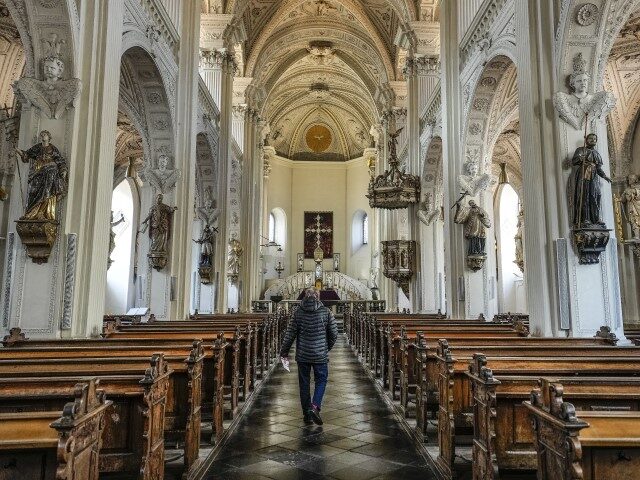ROME — An ongoing exodus from the Catholic Church in Germany has produced a financial and membership crisis, a new report asserts.
According to a report appearing in Kirche und Recht, the German Catholic Church stands to lose some 40,000 properties by 2060, including rectories, community centers, and churches.
The Catholic Church has been in freefall in Germany for years, as its ever more progressive leadership has all but abandoned the countercultural mission of preaching the gospel in favor of trendy social engagement and moral permissiveness.
In March, papal biographer George Weigel warned the “synodal way” undertaken by the German Catholic bishops looks oddly like a second Protestant Reformation.
The Catholic Church in Germany has exploited Pope Francis’ call to undertake a listening process called the “Synodal Way,” using the pretext of dialogue to propose radical changes to established Church teaching, Weigel noted in a Wall Street Journal op-ed.
For instance, the German Synodal Way decided “to rewrite the Catholic Church’s sexual ethic and sacramental practice by authorizing the formal, liturgical blessing of same-sex unions and calling for women to be admitted to holy orders,” Weigel wrote.
What is unfolding in Germany is akin to “the 16th-century Lutheran Reformation: apostasy,” Weigel proposed, which has led some in Rome to refer to the Synodal Way as the “Suicidal Way.”
In a still-relevant 2015 article titled “The Bleeding German Church,” Vatican journalist Marco Tosatti explored the underlying causes of mass defections from the Catholic Church in Germany, and settled upon two primary causes.
The first was a close alliance between church and state, with believers paying a special church tax, leading to a very wealthy church unwilling to challenge its members.
The Church in Germany is the second largest employer in the country, with only the government employing more people. Many Church employees are non-Christians whose relationship with the church is merely formal.
The second cause of the mass departure of German Catholics has been a progressive trend away from traditional Christian belief toward a liberal position often associated with mainline Protestantism, Tosatti reported.
As a body, the German Church has become known as one of the most progressive in the world, a trend that has made the Church ever more irrelevant for many.
A 2016 academic study found that churches that embrace conservative theology tend to draw more adherents than those that have fallen into progressivism.
The Canadian study, published in the Review of Religious Research, found that successful churches “held more firmly to the traditional beliefs of Christianity and were more diligent in things like prayer and Bible reading.”
The leadership of the German Catholic Church has been in quasi open rebellion for years, ignoring Vatican decrees, unilaterally relaxing sacramental discipline, and watering down the Church’s moral teachings.
In 2019, the German Catholic bishops’ conference issued a statement declaring homosexuality to be just as “normal” as heterosexuality while adding that adultery can no longer be considered a “serious sin.”
Both the homosexual and heterosexual orientation “belong to the normal forms of a sexual predisposition that cannot and should not be changed by any specific socialization,” the bishops’ communiqué stated.
In open opposition to the Vatican, the German Church has partnered with the Central Committee of German Catholics, “a lay group that has demanded the ordination of women, an end to clerical celibacy, the blessing of same-sex unions by the Church and rethinking of all Catholic teachings on sexuality,” they stated.
Reacting to the most recent report, Matthias Kopp, spokesman for the German bishops’ conference, told Our Sunday Visitor (OSV) that the situation is dire.
“It’s a fact that church attendance has strongly reduced, with a significant and steady decline in priestly vocations and church membership, and an increasing loss of financial income,” Kopp said.
“However, the closures have not only affected parish churches — the abandonment of monasteries, as well as of church and charitable institutions, has also led to empty religious houses, pilgrimage centers and chapels,” he added.
Kopp said that some churches “are either no longer needed at all, or not fully needed, while many congregations are already forced to keep their churches closed outside of Mass times.”
“The church has to accommodate the situation of its members, as well as of its buildings, finances and services such as Caritas. This means changes are necessary, and these are the responsibility of parishes and dioceses,” he said.

COMMENTS
Please let us know if you're having issues with commenting.